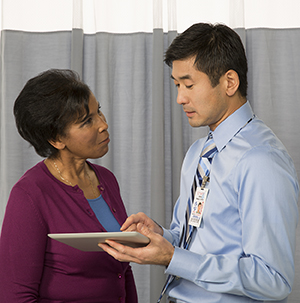Surgical Breast Biopsy: Your Experience
A surgical breast biopsy is done to remove a small piece of tissue from the breast and check for cancer cells. Sometimes the entire lump is removed. A small cut (incision) is made in the skin over the changed breast tissue. The tissue sample is taken out through this cut. It's then sent to a lab for testing. Most surgical breast biopsies are done in a hospital or clinic. They're often done on an outpatient basis. This means you go home the same day.
Understanding the risks
Risks that may happen with surgical biopsy include:
-
Excessive bleeding or bruising
-
Infection
-
Problems from the anesthesia
-
Poor wound healing
-
Change in breast shape
-
A scar
-
The correct area was not biopsied. This will need another biopsy.
Before the biopsy
Tell your surgeon about any medicines, vitamins, supplements, or herbs you take. This includes prescription medicines. And it includes over-the-counter medicines, such as aspirin, CBD, and street drugs and marijuana. Some of these may affect your body’s response during surgery. On the day of the biopsy, wear a loose shirt that buttons in front. Also arrange for a trusted adult to drive you home.
 |
| Tell your healthcare provider about all medicines you take. |
During the biopsy
Your biopsy may be done at a hospital, outpatient surgical clinic, or healthcare provider's office. You may receive local anesthesia to help you not feel pain in the biopsy area. Or you may receive general anesthesia that makes you sleep and not feel pain. After the abnormal breast tissue is removed, the provider may use stitches to close the skin. The incision site will be covered with a dressing.
After the biopsy
In most cases, you can go home the day of the biopsy. You may have bruising and swelling for a few days. If you need them, your surgeon may give you pain medicines. Be sure you know what kind of medicine you can take if you have pain. Waterproof ice packs can also help ease minor soreness or swelling.
Leave your bandage (dressing) on for as long as your surgeon suggests. Follow your surgeon’s advice about bathing and exercise. Here are more tips:
-
Don't do any physical work or strenuous activity for the first 24 hours after the procedure. You can usually return to your normal routine after this brief period of rest.
-
Ask how long you should use an ice pack over the biopsy area. To make an ice pack, put ice cubes in a plastic bag that seals at the top. Wrap the bag in a clean, thin towel or cloth to protect your skin. Never put ice or an ice pack right on your skin.
-
Ask when your bandage can be taken off. Also ask when you can take your medicines again, including aspirin.
-
You may have a bruise for 1 to 2 weeks after the procedure. This is normal. You may also have a small scar. Ask about wearing a supportive bra to help with discomfort.
-
Ask your healthcare provider when you will get the results of the biopsy and who will explain them to you.
When to call your surgeon
Call your surgeon if you have any of these:
-
A fever over 100.4°F ( 38°C) or higher, or as advised by your healthcare provider
-
Chills
-
Increased pain, warmth, or redness at the incision site
-
Severe swelling that doesn’t get better in a few days or gets worse
-
Drainage from the incision site
-
Bleeding that soaks through the dressing
-
Shortness of breath or trouble breathing
Talk with your healthcare provider about what problems to look for and when to call them. Know what number to call with questions or problems, including after office hours, on weekends, and on holidays.
Online Medical Reviewer:
Jessica Gotwals RN BSN MPH
Online Medical Reviewer:
Susan K. Dempsey-Walls RN
Online Medical Reviewer:
Todd Campbell MD
Date Last Reviewed:
8/1/2023
© 2000-2024 The StayWell Company, LLC. All rights reserved. This information is not intended as a substitute for professional medical care. Always follow your healthcare professional's instructions.